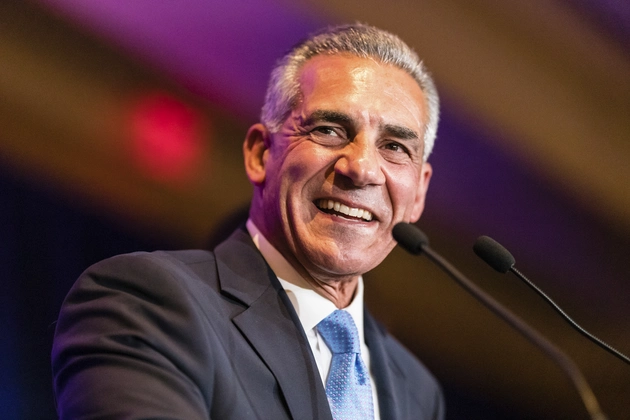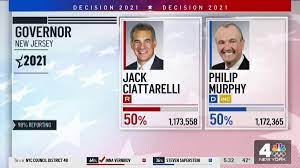
By Christopher Binetti, Ph.D.

He Lost a Squeaker in 2021. Will 2025 give Jack Ciattarelli a win for the governorship of New Jersey?
⸻
Jack Ciattarelli is not a typical politician. He is first and foremost a policy thinker, an economics man, an accountant, a businessman — and, above all, a New Jerseyan.
Unlike his opponent, Congresswoman Mikie Sherrill, who has spent most of her career in public service, Ciattarelli has deep roots in both the private sector and government. He is also, importantly, a lifelong New Jersey resident. When Sherrill first ran for office, questions were raised because she did not live in the district she sought to represent. While legal, many, including myself, found it ethically questionable. Sherrill campaigns largely on national values, often framing issues from a one-size-fits-all perspective that doesn’t necessarily fit New Jersey’s unique challenges.
Ciattarelli, by contrast, is distinctly New Jersey. He doesn’t brand himself as such — it is simply who he is. Italian American by heritage and quintessentially Italo-Jerseyan in manner, he embodies a local identity that stands apart from the national Republican mold.

⸻
Ciattarelli’s campaign revolves almost entirely around economic issues. He argues that fair laws and equal policies will naturally secure civil rights for all, rather than legislating through identity politics. This frustrates some, especially within Italian American and other minority communities, who would like stronger acknowledgment of civil rights. But unlike many Republicans, Ciattarelli avoids culture-war rhetoric. He does not rail against DEI initiatives or frame diversity policies as enemies. Instead, he insists that fairness and economic opportunity are the foundation of equality.
New Jersey’s economy is slowing. Businesses face heavy taxes, excessive regulations, and declining investment. Ciattarelli positions himself as the low-tax candidate, promising relief that Democrats, for both ideological and logistical reasons, cannot deliver. Voter attitudes toward taxes appear to be shifting, in part because the cost of living — electricity, food, and property taxes — has soared since the last election, under Columbus hating governor, Massachusetts transplant, Phil Murphy.
Electricity is a particularly potent issue. Rising utility costs, often overseen by state-regulated monopolies, disproportionately affect the poor, the disabled, and minority communities. Sherrill has offered few answers here, while Ciattarelli highlights it as a kitchen-table issue that crosses party and racial lines.

⸻
Though his economic focus echoes strategies used by President Trump in 2020, Ciattarelli should not be mistaken for a Trumpist. He is not a social crusader, nor does he oppose DEI in a systemic way. His approach is pragmatic, inclusive, and local.
Still, the challenges are steep. Democrats have controlled both houses of the legislature for more than 30 years. Ciattarelli told me he believes he can flip 13 seats in the General Assembly, giving him leverage to push through reforms. He dismissed Democratic gerrymandering as ineffective this time — though whether voters agree remains to be seen.
⸻
The Abortion Divide
One area where Ciattarelli breaks from many Republicans is abortion. While personally pro-choice, he supports a ban on abortions after 20 weeks, when scientific evidence suggests fetuses can feel pain. This is even stricter than the 24-week “late-term” cutoff debated nationally.
Currently, New Jersey law permits abortions until birth, often with taxpayer support, and does not require parental notification, even for very young girls. Ciattarelli would change this. Sherrill, on the other hand, has called for enshrining abortion rights in the state constitution and expanding access and funding. On this issue, Ciattarelli may be closer to the average New Jersey voter than his opponent.


⸻
Jack Ciattarelli is not Trump. He is not Mikie Sherrill. He is a policy-driven New Jerseyan who emphasizes economics and affordability over national partisanship. His focus on taxes, utilities, and property burdens resonates widely. His Italo-Jersey identity makes him unique, though I worry about his reluctance to champion Italian American civil rights in a state where DEI has so much influence.
For now, I offer no endorsement. Italians — and all New Jerseyans — should weigh both candidates carefully. But I do appreciate Ciattarelli’s willingness to speak directly, and his campaign deserves serious attention.
Editor’s Note: Dr. Christopher Binetti holds a Ph.D. in Political Science (University of Maryland, College Park), an M.A. in Political Science, and an M.A. in History (both from Rutgers–Newark), and a B.A. in History from Vassar College. He serves as an adjunct lecturer in political science at Saint Peter’s University in Jersey City, NJ and is a published political theorist and historian with a focus on republicanism and representation.
Photographs: From top, Jack Ciattarelli speaks to enthusiastic supporters; two candidates - Democrat Mikie Sherrill and Republican Jack Ciattarelli; Jack Ciattarelli with his son, Jake, a captain in the U.S. Army; Jack Ciattarelli with actor Vincent Curatola, who played Johnny Sack in the HBO series, "The Sopranos"; Election Night 2021 went down to the wire with Ciattarelli almost scoring an upset win agains incumbent governor, Philip Murphy.
It will be down to the wire this November when voters cast their ballots in New Jersey to elect a new governor.
Right now, college-run polls show the Democratic candidate Mickie Sherrill ahead of the Republican, Jack Ciattarelli. What else is new? The polls always give the Democrat the lead this time of the year. The purpose of an early show of hands has always been to discourage Republican turnout, not to show an accurate picture of voter sentiment. Why would 2025 be any different?
This race will be close. Jack can win it.
NJ is in a shambles thanks to the Massachusetts born and bred, Columbus hating governor, Phil Murphy. His second term might be the worst of any governor in NJ history. Sky high electricity rates vie with high property taxes for a neck and neck race of the unseemly burdens of NJ residents. How much more can they take?
Democrats still hold a large registration edge, but those pesky independents, neither affiliated to one party or the other, are growing leaps and bounds in New Jersey. Meanwhile, the GOP has been narrowing the gap this summer.
Last go-around for the NJ governor’s race, the polls, pundits, and plaudits said Murphy was going to win a landslide reelection. Instead, he limped across the finish line after Ciattarelli clobbered him in a host of counties. The race was too close to call on Election Night. And so, we had the recounts - and wouldn’t you know it - Murphy won 51 to 48 percent in 2021. Atlantic, Cumberland, and Gloucester flipped red that year; Somerset trended blue vs. the state. Here’s the latest analysis of Jack’s chances to win the Garden State.
County-by-county cheat sheet (21 counties)
NORTH / NORTHEAST SUBURBS
• Bergen — Big, diverse, suburban bellwether. Sherrill’s home-region help Dems. Path for Jack: hammer property taxes/NJ Transit reliability, promise no culture-war drama. Keep the D margin modest to stay viable statewide.
• Passaic — Paterson/Clifton make this lean-D. Path: emphasize small-biz costs and commuting; aim for outsized indie share in Wayne/Clifton.
• Essex — Deep-blue base (Newark, Montclair). Path: Jack, you won’t win, but shrink the loss in suburbs by sounding pragmatic on schools/taxes; ignore hot-button social fights.
• Hudson — Machine-blue (Jersey City/Hoboken). Path: turnout there will decide Dem ceiling. Focus resources elsewhere; just hit your floor.
NORTHWEST / EXURBS
• Morris — Former GOP fortress, now swingy. Jack did well here in 2021. Path: win Morris with a calm, fiscal pitch and commuter/roads/NJ Transit specifics.
• Somerset — Jack’s backyard, but trended Democratic in 2021. Path: flip or come very close by localizing affordability; heavy retail politics.
• Sussex, Warren — Ruby-red turnout banks. Path: run up margins without chasing national fights; keep focus on taxes, energy bills, and permits.
• Hunterdon — Still-red, affluent. Path: strong fiscal-manager profile, win big with college-educated moderates.
CENTRAL / URBAN RING
• Middlesex — Expensive media market + Edison/New Brunswick tilt blue. Path: cut Dem edge with ratepayer relief (utilities) and small-biz permitting reform.
• Union — Blue, public-sector heavy. Path: emphasize efficiency/NJ Transit; keep losses contained.
• Mercer — Deep-blue (Trenton/Princeton). Path: protect floor in suburbs; move on.
SOUTH & THE SHORE
• Monmouth — GOP base builder. Path: big margin + high turnout; keep the message strictly affordability and schools.
• Ocean — Your largest vote-bank county. Path: maximize margin/turnout; keep message pocketbook-only.
• Atlantic — Flipped red in 2021. Casinos & shore economy = price-sensitive voters. Path: re-create 2021 coalition: cost of living, property taxes, and skepticism about stalled offshore wind investments and utility hikes.
• Cape May — Solid red. Path: strong turnout; tourism-linked cost themes.
• Cumberland — Flipped red in 2021. Rural/minority mix; price shocks bite. Path: repeat 2021 with food/energy/transport affordability.
• Gloucester — Flipped red in 2021. One of Jack’s must-holds. Path: union households open to an anti-waste, pro-jobs pitch if it’s local, not national.
• Salem — Small, red-leaning. Path: bank votes; talk energy/utility reliability.
• Burlington — Trended D (Philly suburbs). Path: keep it close with a no-drama suburban pitch; veterans/military families respond to NJ Transit + taxes.
• Camden — Deep-blue machine county. Path: limit losses; spend elsewhere.
NORTH / PASSAIC-ADJACENT
• Bergen/Passaic recap: If Jack keeps Bergen within mid-single digits and over-performs among independents in Passaic’s suburbs, the map opens statewide.
• Add the small reds (Hunterdon/Sussex/Warren/Cape May/Salem): treat as turnout engines.
Max the base
Replicate or exceed 2021 turnout/margins in Ocean + Monmouth and the northwest reds (Sussex/Warren/Hunterdon). Those were the pillars of the 2021 near-upset and remain easiest votes for Jack.
Hold the 2021 flips
Atlantic, Gloucester, Cumberland must stay red (or very close) with a relentlessly affordability-first message: property taxes, electric and gas bills, and permitting—not national culture fights.
Crack a big suburb
He likely needs to win Morris and fight to a near-tie in Somerset. A modest Bergen loss is survivable; a double-digit one is not.
Blunt the blue walls
Jack, you can’t win Essex, Hudson, Camden, Mercer, Union, but you must reduce Dem margins in commuter suburbs by foregrounding NJ Transit reliability and taxes and by pledging not to govern as a culture-warrior.
Own “affordability” & localize energy
NJ paused new offshore-wind awards and the feds just pulled wind port funding—voters associate this with rates and reliability. Jack - frame a ratepayer-first plan (grid upgrades, competition, guardrails on utility increases) to contrast with Sherrill’s clean-energy framing without attacking the concept outright.
Independents are the ballgame
Registration shifts show unaffiliated growth; message discipline (taxes, transit, schools, “no drama”) is how he converts them.
Don’t relive 2021’s polling trap
2021 showed Republicans can surge with base-county turnout, but the margin lives in Bergen/Middlesex/Morris/Somerset/Burlington/Atlantic. Deploy candidate time and field accordingly.
Jack Must Hit These Targets
• Must win: Ocean, Monmouth, Morris, Hunterdon, Sussex, Warren, Cape May, Salem (+ ideally Atlantic, Gloucester, Cumberland).
• Must keep close (within low single digits if possible): Bergen, Somerset, Burlington, Middlesex, Passaic.
• Can lose but contain margins: Essex, Hudson, Camden, Union, Mercer.